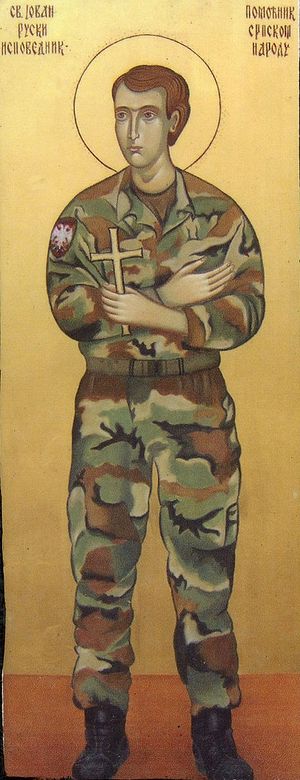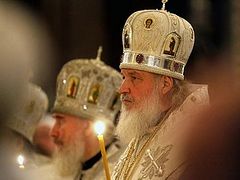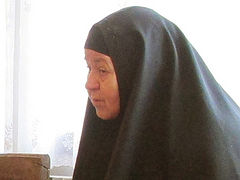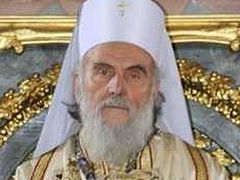The nuns of the St. Prohor Pcinjski Convent, situated in the south of Serbia a few miles from the Macedonian border, told us this story.
When we dropped in at the convent’s icon shop we spotted an unusual icon: A saint was depicted with a cross in his hand (it was clear that he was a martyr or a confessor), but he was clothed in a soldier uniform and not traditional garments. Someone supposed that it was a depiction of the Russian martyred soldier Evgeny Rodionov, who remained faithful to Christ to the end, did not agree to take his cross off and was murdered by Chechen bandits on May 23, 1996, at age nineteen. But it was not he: As was seen on the icon, the coat of arms on the soldier uniform was Serbian, not Russian. We took a magnifying glass and read the following inscription in Serbian: “Saint John the Russian, a Confessor. A helper of the Serbian people.” Why was he in the Serbian uniform then? What did it mean? True, all saints are our helpers regardless of nationalities. We ask for the intercession of such saints as George the Victorious, Isaac the Syrian, Nicholas the Wonderworker of Myra and Moses the Black. But why the Holy Confessor John the Russian?
This is what the nuns told us. Everybody well remembers the horrific NATO bombing campaign of March 1999, as a result of which Kosovo and Metohija, the cradle of Serbian Orthodoxy, fell under the power of Islamists and their masters—the NATO “peace-keepers”. We also remember those mocking “Paschal greetings” that the invaders wrote on the bombs and missiles. As a result of these bombardments thousands of people were killed. The main victims of that brutal campaign were innocent civilians. According to UN Special Representative for Human Rights in the former Yugoslavia Jiri Dienstbier, NATO’s Balkan operation caused more deaths among civilians than the very conflict in Kosovo for whose resolution it seemingly was launched. The ecology of Serbia was devastated, the country’s industries were ruined. Now, eighteen years after those events, Serbia, used to endless wars through its history, is gradually being restored. But more prolonged bombardments would most likely have led to a total chaos in the country and a greater number of victims. Yes, Serbia was forced to submit to NATO in order to avoid the country’s total destruction and devastation. And, as we remember, Russia (which had previously lent a helping hand to Serbia on many occasions) was not a reliable partner at that moment.[1] But Serbs relied on Russian saints. The Holy Confessor John the Russian was a striking example of humility in the difficult circumstances that the Serbs were going through. In his captivity in Turkey, St. John converted many people to Christ through his humility. There were no secular, resounding victories in his life, there were no high-sounding hymns in praise of the Russian tsar, but there was the victory of Christ and humility—a quiet and radiant victory of God Who prefers to convince by His presence and love, in a still small voice (1 Kings 19:12).
And, as the nuns told us, St. John the Russian appeared to one Serbian monk from Mt. Athos while he was fervently praying (in the vision the saint was clothed in a Serbian military uniform). St. John said: “I am going to help my brothers, the Serbs.” On the following day, June 10, 1999, the NATO bombing ended…
Christians have faced trials at any time during history, and our days are no exception. If we look at what is going on in Kosovo and Metohija, it cannot be called a peaceful and happy life at all. However, the Good News of Christ is still being spread despite everything. And, according to the monks of local monasteries, some of the Albanians and NATO soldiers who at first disregarded Orthodoxy and even were hostile toward it, eventually became committed Orthodox Christians. Some embraced Orthodoxy after experiencing miracles, others were inspired by the above-mentioned “still small voice”—the peaceful light of Christ’s love that triumphs over all kinds of weapons. So it is too early to say that Orthodoxy in Kosovo and Metohija is dead. If one saintly Russian captive was able to convert thousands of people to Christ through his meekness, then why can’t thousands of Orthodox Serbs, who became captives in their native land, do the same?





